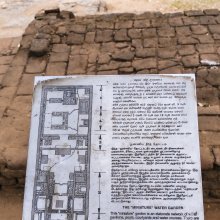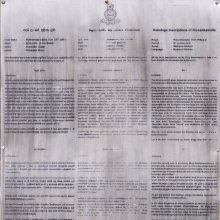Anagata, Anāgata: 21 definitions
Introduction:
Anagata means something in Buddhism, Pali, Hinduism, Sanskrit, Marathi, Hindi. If you want to know the exact meaning, history, etymology or English translation of this term then check out the descriptions on this page. Add your comment or reference to a book if you want to contribute to this summary article.
Alternative spellings of this word include Anagat.
Images (photo gallery)
In Hinduism
Purana and Itihasa (epic history)
Source: archive.org: Puranic EncyclopediaAnāgata (अनागत).—(See PAÑCATANTRA).

The Purana (पुराण, purāṇas) refers to Sanskrit literature preserving ancient India’s vast cultural history, including historical legends, religious ceremonies, various arts and sciences. The eighteen mahapuranas total over 400,000 shlokas (metrical couplets) and date to at least several centuries BCE.
Ayurveda (science of life)
Source: gurumukhi.ru: Ayurveda glossary of termsAnāgata (अनागत):—Partially manifestation or no manifestation of the diseases. Diseases may be communicable or non-communicable or lifestyle related.

Āyurveda (आयुर्वेद, ayurveda) is a branch of Indian science dealing with medicine, herbalism, taxology, anatomy, surgery, alchemy and related topics. Traditional practice of Āyurveda in ancient India dates back to at least the first millenium BC. Literature is commonly written in Sanskrit using various poetic metres.
In Buddhism
Mahayana (major branch of Buddhism)
Source: Wisdom Library: Maha Prajnaparamita Sastra1) Anāgata (अनागत) refers to the “future time”, according to Mahāprajñāpāramitāśāstra (chapter 2).—Accordingly, “Present time (pratyutpanna) is like a ball of clay (mṛd-piṇḍa), past time (atīta) like the dust of the earth (pṛthivī-rajas) and future time (anāgata) like the vase (ghata). Since time is eternal (nitya), the past does not make the future, for according to your texts, time is a single substance (ekadravya). This is why the past does not make the future or the present, for they are confused with the past. In the past there is no future. That is why there is no future or present”.
2) Anāgata (अनागत) or Anāgatajanma refers to “future (generations)”, according to Mahāprajñāpāramitāśāstra (chapter 4).—Accordingly, “[Question: Why is the Buddha called Samyaksaṃbuddha?]—[Answer]: [...] Finally, the languages (adhivacana) of all the universes (lokadhātu), the ten directions (daśadiś), the languages of beings (sattva) in the six destinies (gati), the history of previous lives (pūrvajanma-nidāna) of beings and their birthplaces (utpādasthāna) in future generations (anāgata-janma), the natures of the mind (cittalakṣaṇa) of all beings in the ten directions, their fetters (saṃyojana), their roots of good (kuśalamūla) and their outcome (niḥsaraṇa): all the Dharmas of this kind he knows in detail. This is why he is called Samyaksaṃbuddha”.
3) Anāgata (अनागत) or Anāgatacitta refers to the “future mind”, according to Mahāprajñāpāramitāśāstra (chapter 31).—Accordingly, “[...] The past mind (atīta-citta), being already destroyed (bhagna), does not experience the happiness; the future mind (anāgata-citta), being not yet born (utpanna), does not experience the happiness; the present mind (pratyutpanna-citta), being momentary (ekakṣaṇika) and fleeting (kṣipra), does not have the awareness to experience the happiness”.
Source: academia.edu: A Study and Translation of the GaganagañjaparipṛcchāAnāgata (अनागत) refers to the “future”, according to the Gaganagañjaparipṛcchā: the eighth chapter of the Mahāsaṃnipāta (a collection of Mahāyāna Buddhist Sūtras).—Accordingly, as the Bodhisattva Maitreya addressed himself to the Lord: “Lord, I will protect this unexcelled treasury of the Dharma Jewel for the sake of the complete extinction of the Tathāgata. Why is that? Because, Lord, this is the true dharma of myself and the Awakened Lords in the past (atīta), present (pratyutpanna) and future (anāgata). Lord, when I have dwelled in the Tuṣita Heaven, I have strived for protecting, upholding, and keeping these sūtras for a long time. [...]”.

Mahayana (महायान, mahāyāna) is a major branch of Buddhism focusing on the path of a Bodhisattva (spiritual aspirants/ enlightened beings). Extant literature is vast and primarely composed in the Sanskrit language. There are many sūtras of which some of the earliest are the various Prajñāpāramitā sūtras.
General definition (in Buddhism)
Source: Wisdom Library: Dharma-samgrahaAnāgata (अनागत) or Anāgatādhvan refers to the “future time” and represents one of the “three times” (adhvan) as defined in the Dharma-saṃgraha (section 86). The Dharma-samgraha (Dharmasangraha) is an extensive glossary of Buddhist technical terms in Sanskrit (e.g., anāgata). The work is attributed to Nagarjuna who lived around the 2nd century A.D.
Languages of India and abroad
Pali-English dictionary
Source: BuddhaSasana: Concise Pali-English Dictionaryanāgata : (adj.) not come yet. (m.), the future.
Source: Sutta: The Pali Text Society's Pali-English DictionaryAnāgata, (adj.) (an + āgata) not come yet, i. e. future. On usual combn. with atīta: see this. D.III, 100 sq., 134 sq., 220, 275; M.III, 188 sq.; S.I, 5; II, 283; A.III, 100 sq., 400; Sn.318, 373, 851; It.53; J.IV, 159; VI, 364; Dhs.1039, 1416. (Page 31)

Pali is the language of the Tipiṭaka, which is the sacred canon of Theravāda Buddhism and contains much of the Buddha’s speech. Closeley related to Sanskrit, both languages are used interchangeably between religions.
Marathi-English dictionary
Source: DDSA: The Molesworth Marathi and English Dictionaryanāgata (अनागत).—a (S) Unarrived, not come, future.
Source: DDSA: The Aryabhusan school dictionary, Marathi-Englishanāgata (अनागत).—a Not come, future.
Marathi is an Indo-European language having over 70 million native speakers people in (predominantly) Maharashtra India. Marathi, like many other Indo-Aryan languages, evolved from early forms of Prakrit, which itself is a subset of Sanskrit, one of the most ancient languages of the world.
Sanskrit dictionary
Source: DDSA: The practical Sanskrit-English dictionaryAnāgata (अनागत).—a. [na āgataḥ, na. ta.]
1) Not come or arrived; तावद्भयस्य भेतव्यं यावद्भयमनागतम् (tāvadbhayasya bhetavyaṃ yāvadbhayamanāgatam) H.1.54.
2) Not got or obtained; वर्धिष्णुमाश्रयमनागतमभ्युपैति (vardhiṣṇumāśrayamanāgatamabhyupaiti) Śiśupālavadha 5.14; so °आर्तव (ārtava).
3) Future, to come; see compounds below.
4) Not learnt or attained, unknown.
-tam The future time, future; °तं यः कुरुते स शोभते (taṃ yaḥ kurute sa śobhate) Pañcatantra (Bombay) 3.164 he shines (thrives, prospers) who provides for the future; अनागतवतीं चिन्तामसंभाव्यां करोति यः (anāgatavatīṃ cintāmasaṃbhāvyāṃ karoti yaḥ) Pañcatantra (Bombay) 5.17.
Source: Cologne Digital Sanskrit Dictionaries: Shabda-Sagara Sanskrit-English DictionaryAnāgata (अनागत).—mfn.
(-taḥ-tā-taṃ) 1. Not come, not arrived: (of a person, absent;) future, (of time.) 2. Unknown, undistinguished. 3. Not acquired, learned or obtained. E. an neg. āgata come, &c.
Source: Cologne Digital Sanskrit Dictionaries: Benfey Sanskrit-English DictionaryAnāgata (अनागत).—[an-ā-gata], (vb. gam), adj., f. tā. 1. Not arrived, [Rājataraṅgiṇī] 5, 171. 2. Future, Böhtl. Ind. Spr. 89. anāgataṃ kṛ, To make dispositions for the future, ib. 88. 3. Not mentioned, [Rāmāyaṇa] 3, 56, 18.
Source: Cologne Digital Sanskrit Dictionaries: Cappeller Sanskrit-English DictionaryAnāgata (अनागत).—[adjective] not yet come, future.
Source: Cologne Digital Sanskrit Dictionaries: Monier-Williams Sanskrit-English Dictionary1) Anāgata (अनागत):—[=an-āgata] mfn. (√gam), not come, not arrived
2) [v.s. ...] future
3) [v.s. ...] not attained, not learnt
4) [v.s. ...] unknown
5) [v.s. ...] n. the future.
Source: Cologne Digital Sanskrit Dictionaries: Goldstücker Sanskrit-English DictionaryAnāgata (अनागत):—[tatpurusha compound] I. m. f. n.
(-taḥ-tā-tam) 1) Not arrived, not approached.
2) Not acquired, not learnt, not obtained.
3) Unknown, undistinguished.
4) Not yet come, future. Ii. n.
(-tam) The future time. E. a neg. and āgata.
Source: Cologne Digital Sanskrit Dictionaries: Yates Sanskrit-English DictionaryAnāgata (अनागत):—[anā+gata] (taḥ-tā-taṃ) a. Absent; future; unknown.
Source: DDSA: Paia-sadda-mahannavo; a comprehensive Prakrit Hindi dictionary (S)Anāgata (अनागत) in the Sanskrit language is related to the Prakrit word: Aṇāgaya.
[Sanskrit to German]
Sanskrit, also spelled संस्कृतम् (saṃskṛtam), is an ancient language of India commonly seen as the grandmother of the Indo-European language family (even English!). Closely allied with Prakrit and Pali, Sanskrit is more exhaustive in both grammar and terms and has the most extensive collection of literature in the world, greatly surpassing its sister-languages Greek and Latin.
Hindi dictionary
Source: DDSA: A practical Hindi-English dictionaryAnāgata (अनागत) [Also spelled anagat]:—(a) (the) future, not come, not attained; unknown.
...
Kannada-English dictionary
Source: Alar: Kannada-English corpusAnāgata (ಅನಾಗತ):—
1) [adjective] not come or arrived; not happened (so far).
2) [adjective] not got or obtained.
3) [adjective] not learnt or attained; unknown.
--- OR ---
Anāgata (ಅನಾಗತ):—
1) [noun] the time that is (yet) to come; the future.
2) [noun] what will happen; what is going to be.
Kannada is a Dravidian language (as opposed to the Indo-European language family) mainly spoken in the southwestern region of India.
See also (Relevant definitions)
Starts with (+9): Anagata Sutta, Anagatabadha, Anagatabadhapratishedha, Anagatabuddha, Anagatacinta, Anagatacitta, Anagatadhvan, Anagatadinamka, Anagatagraha, Anagatajanma, Anagatajna, Anagatakartri, Anagatam, Anagatamantrana, Anagatamati, Anagatapuje, Anagatartava, Anagatartave, Anagatasiddhi, Anagatavamsa.
Ends with (+11): Ajnanagata, Annanagata, Antardhanagata, Anyatsthanagata, Arohanagata, Atmasanagata, Avamardanagata, Cakrasanagata, Caranagata, Charanagata, Danagata, Dharmasanagata, Ekayanagata, Grahanagata, Grasanagata, Hairanagata, Hayaranagata, Karanagata, Khanagata, Kshanagata.
Full-text (+32): Anagatavidhatri, Anagatabadha, Anagatartava, Anagatavekshana, Anagatavat, Anagatavant, Atita, Arannaka Sutta, Anagatam, Anagamya, Agata, Anagamopabhoga, Anagamishyat, Anagati, Pajappati, Anagaya, Anagamuka, Adhvan, Pajappa, Anagatavidhata.
Relevant text
Search found 22 books and stories containing Anagata, Anāgata, An-agata, An-āgata; (plurals include: Anagatas, Anāgatas, agatas, āgatas). You can also click to the full overview containing English textual excerpts. Below are direct links for the most relevant articles:
Garga Samhita (English) (by Danavir Goswami)
Verse 8.9.7 < [Chapter 9 - Lord Balarāma’s Rāsa Dance]
Yoga-sutras (with Vyasa and Vachaspati Mishra) (by Rama Prasada)
Sūtra 2.16 < [Book 2 - Practice (Sādhana)]
Sūtra 3.16 < [Book 3 - Attainment (Vibhūti or Siddhi)]
Sūtra 4.12 < [Book 4 - Absolute Independence (Kaivalya)]
Maha Prajnaparamita Sastra (by Gelongma Karma Migme Chödrön)
Appendix 5 - The three times: Past (atīta), Future (anāgata), Present (pratyutpanna) < [Chapter XLI - The Eighteen Special Attributes of the Buddha]
Part 2 - Understanding tathatā, dharmatā and anutpādakoṭi < [Chapter L - Arriving at the other Shore]
Part 1 - Seeing the fields of the Buddhas of the three times < [Chapter LI - Seeing all the Buddha Fields]
Yogadrstisamuccaya of Haribhadra Suri (Study) (by Riddhi J. Shah)
Chapter 2.3 - Date of Haribhadrasūri < [Chapter 2 - Life, Date and Works of Ācārya Haribhadrasūri]
Vakyapadiya of Bhartrihari (by K. A. Subramania Iyer)
Verse 3.3.54 < [Book 3 - Pada-kāṇḍa (3): Sambandha-samuddeśa (On Relation)]
Verse 3.3.39 < [Book 3 - Pada-kāṇḍa (3): Sambandha-samuddeśa (On Relation)]
A Manual of Abhidhamma (by Nārada Thera)
Summary of Objects < [Chapter III - Miscellaneous Section]


